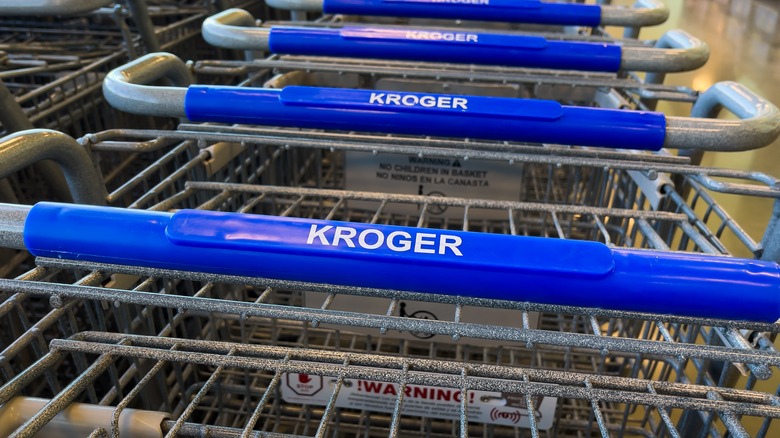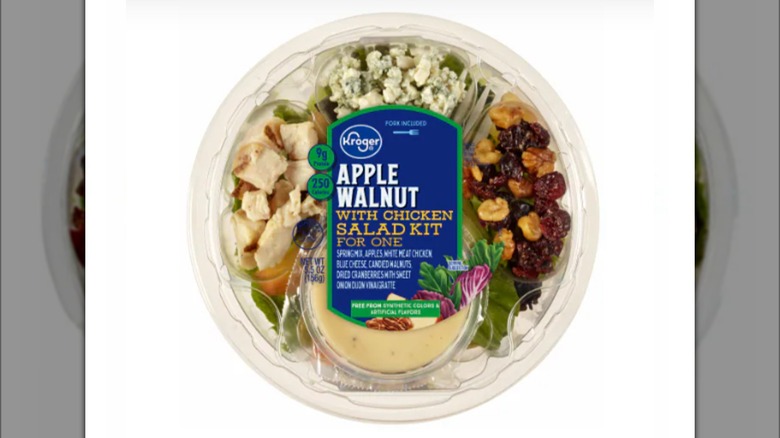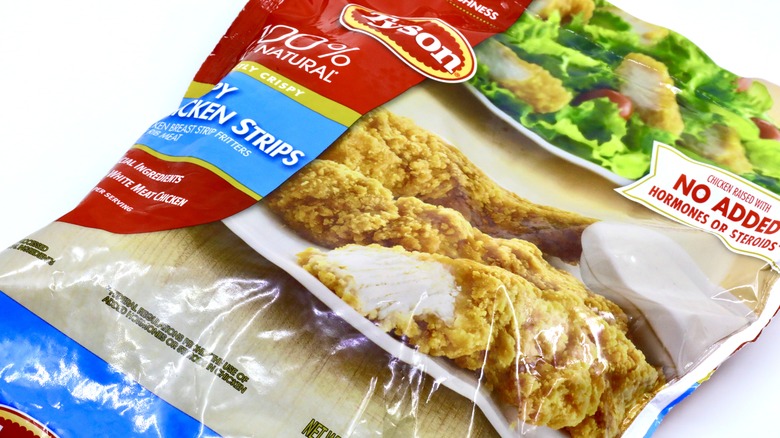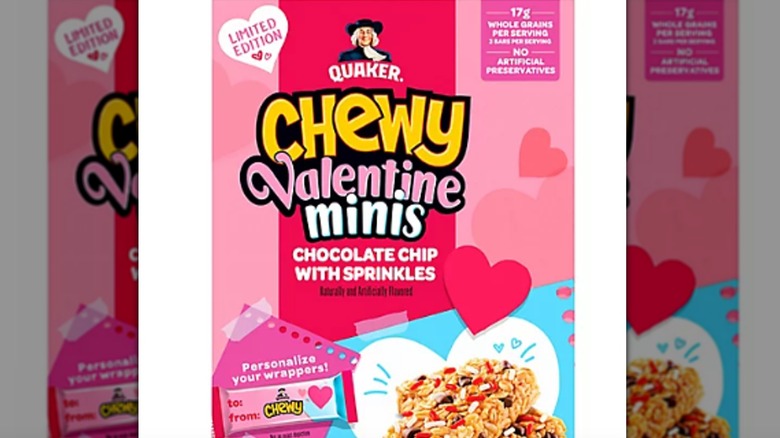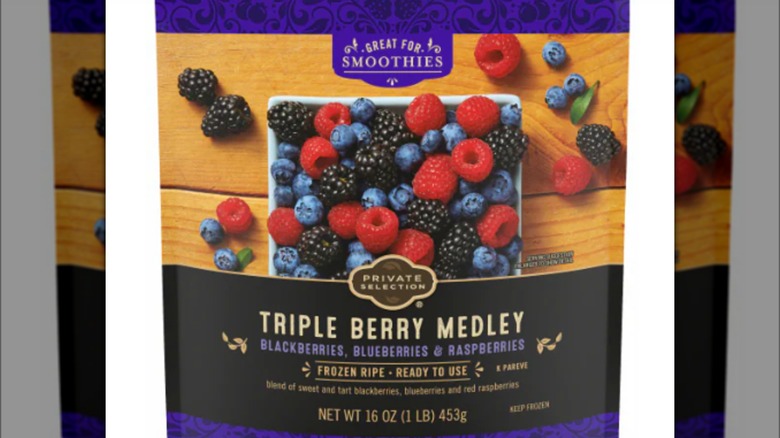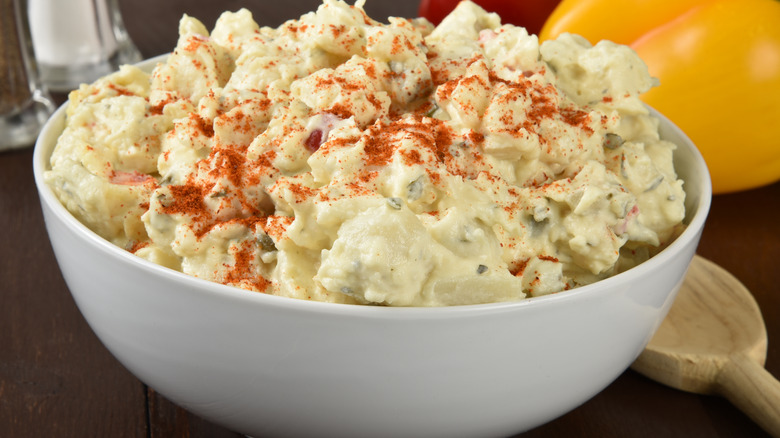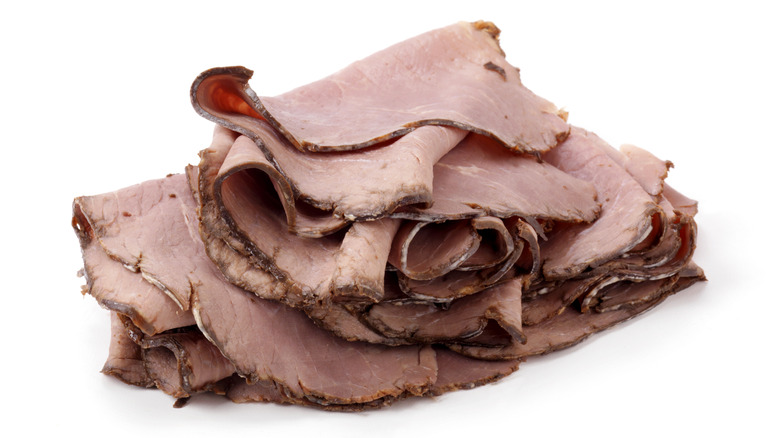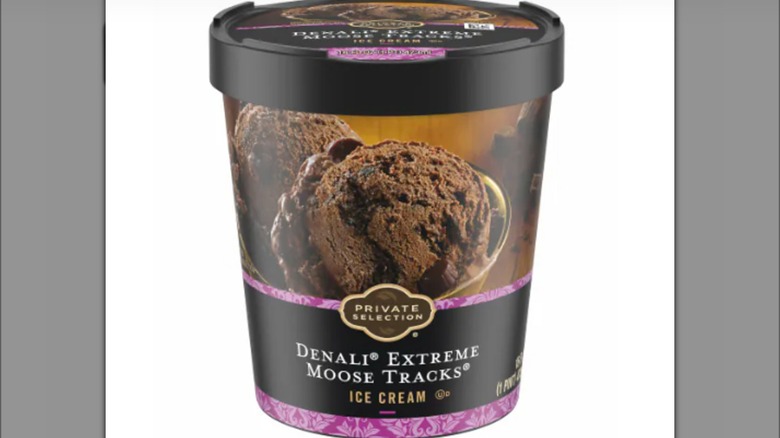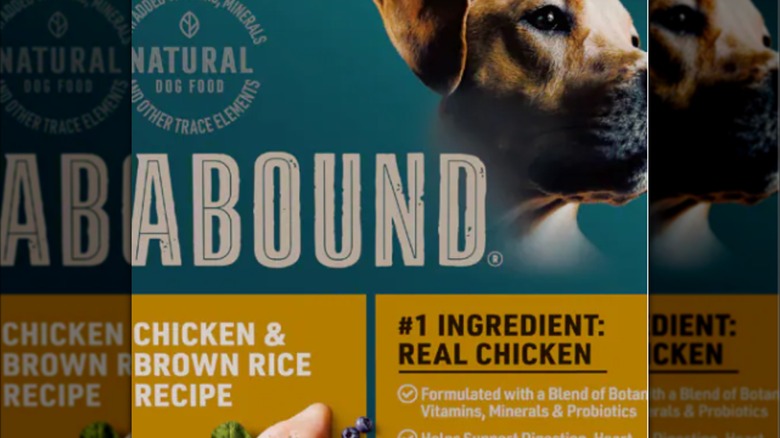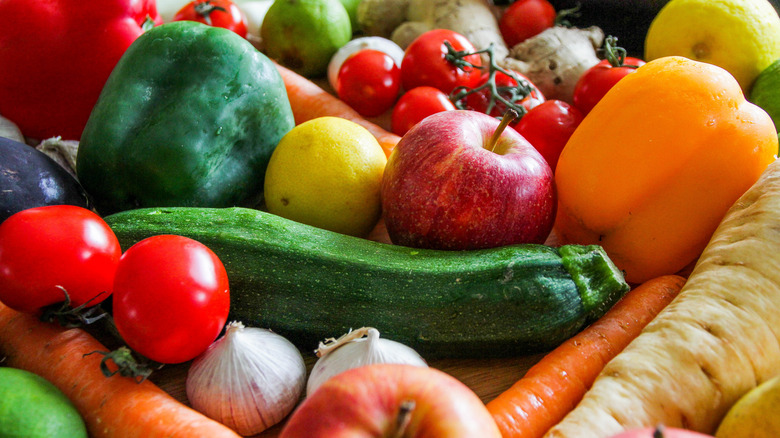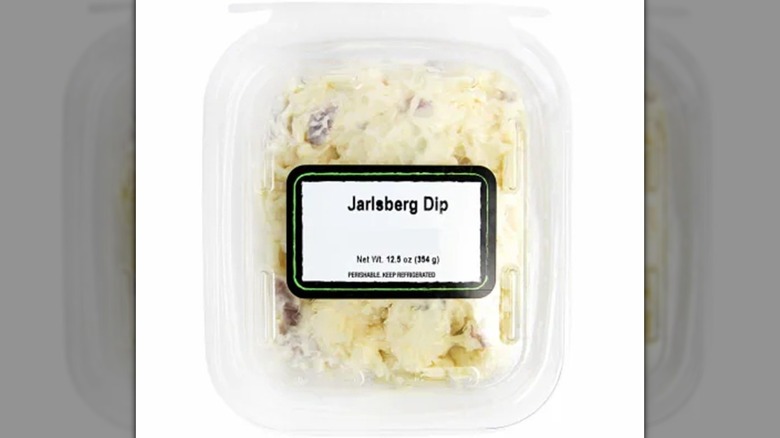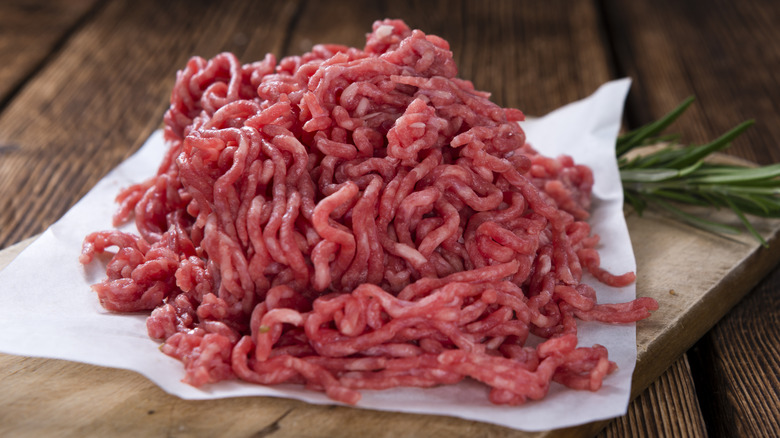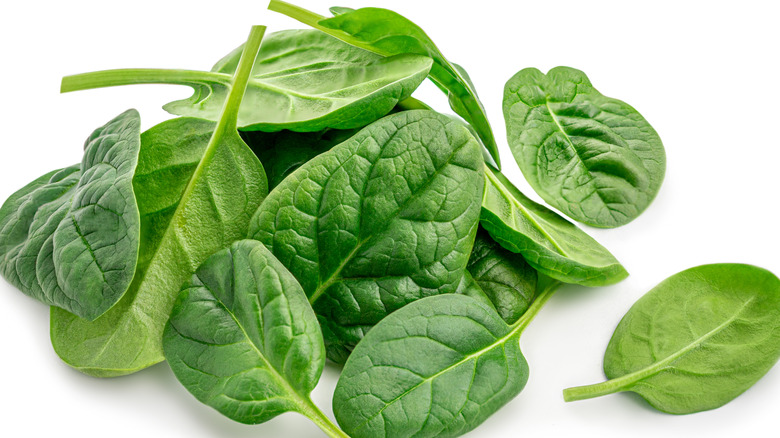The Biggest Food Recalls In Kroger History
It's the largest grocer in America, with around 2,800 stores in operation across 35 different states. We're talking about Kroger, of course ... although you may know it as Harris Teeter, Fred Meyer, Smith's, or Baker's. Kroger's yearly sales combined from over 20 grocery store brands sits at a whopping $132.5 billion — making for a remarkably wide-reaching net in regard to the sheer number of customers.
Seeing as Kroger serves such a large amount of hungry shoppers on a daily basis, keeping the company's aisles of meat, produce, snacks, spreads, and more safe for consumption at all times is especially important when it comes to public safety. An undeclared allergen on a nutrition label, the presence of an E. coli strain in a batch of meat cuts, foreign material inside frozen nuggets ... any of these situations could prove detrimental for Kroger's very long line of unsuspecting customers. Thankfully, there is a recall process for situations such as these — and the Kroger corporation has certainly racked up some notable ones in its time. From salad kits and granola bars to dog food and potato salad, here are some of the biggest food recalls in Kroger history.
Salad bowls
A full and complete list of allergens is arguably the most important element a product can feature, as an accidental rendezvous with gluten, egg, sesame, or peanuts can prove dangerous — in some cases, even fatal — for people with sensitivities. That's why the recent salad bowl recall at Kroger grocery stores had the potential to be so problematic; it involved an undisclosed allergen on a pre-packaged product.
The Kroger Apple Walnut with Chicken Salad Bowl Kit is a ready-to-go meal featuring a fresh spring mix, grilled chicken chunks, chopped apples, dried cranberries, walnuts, blue cheese crumbles, and a sweet vinaigrette to top it all off. With nothing but a shake, you've got yourself a quick and healthy lunch ... a lunch that appeared to be safe for those with celiac disease and other gluten sensitivities, seeing as there was no wheat listed on the label. Unfortunately, the label was incorrect, and Kroger's salad bowls were yanked from shelves in March 2024 on the basis of this undisclosed wheat allergen. The product reads as unavailable on some of Kroger's restaurant brand's websites, suggesting the issue of the mistaken label is perhaps still being rectified in full.
Chicken strips
Who doesn't have a bag of frozen chicken strips stashed away in their freezer for quick weeknight dinners? Chicken strips are a coveted go-to for many consumers, and Tyson is perhaps one of the most well-recognized producers of the popular product. However, an incident in 2019 had many shoppers reaching into the recesses of their deep freezers and tossing out their reliable pouches of breaded poultry. Why, you ask? The answer is stranger than you might expect.
Kroger, along with 31 other retail giants such as Dollar General, Target, and Walmart, were forced to recall 11 million pounds worth of frozen Tyson chicken strips in 2019 after multiple consumers reported that small metal fragments had been found inside the meat. To make matters worse, some of these unlucky eaters were actually harmed during their meal, with three alleging an oral injury as a result of biting down on the sharp pieces. Ouch. The massive recall amassed dozens of states and international locations alike, making for a wide-reaching chicken toss. Food waste, even when necessary, is always a bummer.
Quaker products
Quaker Oats has become a household name, with its smiling hat-clad logo gracing the aisles of what feels like every grocery store in the United States. From oats and cereal to granola bars and rice cakes, Quaker's breakfast-angled products are plentiful ... which becomes a problem when a foodborne illness is suspected to be potentially lurking within them.
In December 2023, the word came down from the Quaker Oats company: A number of its granola bar and cereal products were potentially carrying salmonella. Although this recall was incredibly wide-reaching and stretched across all 50 states, as well as Guam, Puerto Rico, and Saipan, it only affected three products sold at Kroger: Quaker Valentine Minis, Quaker Reduced Sugar Chocolate Chip Granola Bars, and Quaker Chewy Dipps Chocolate Chip.
Incredibly, reports seem to suggest that no one actually fell ill during the unfolding of this wide-scale callback, but we're sure it was a sad day for Quaker fans everywhere. After all, there's nothing quite as disappointing as being informed you can't eat that favorite snack you just finished restocking your pantry with.
Frozen berries
Hepatitis A is an inflammatory disease of the liver that occurs after a person is exposed to the virus. This can occur in a number of ways, such as by consuming affected food or water. Due to the seriousness of Hepatitis A (which can lead to symptoms such as fatigue, abdominal pain, jaundice, and in serious cases, liver failure), any suspicion that a batch of food might be infected should be taken seriously. Thankfully, the Kroger corporation reacted promptly in 2019 when some of its very own frozen berries were found to be carrying the virus.
After a sampling performed by the FDA, three frozen berry products put out by Kroger's Private Selection brand were found to be contaminated with Hepatitis A: Triple Berry Medley in both the 16-ounce and 48-ounce sized bags, along with the 16 ounce Frozen Blackberries. Kroger reacted quickly, pulling the products in question from store shelves and contacting those who had purchased the berries, advising them to speak with their doctors if they'd already consumed the product. While this event almost certainly equated to some ruined smoothie plans, it does not appear to have resulted in any sick shoppers thanks to quick action on Kroger's part.
Potato salad
Ah, potato salad, the ultimate barbecue side dish. Most versions call for eggs though, which can make it hard for cookout guests with an egg allergy. But if you were shopping at Kroger in April 2024, you may have done a little dance for joy when you encountered Simply Sides Jack's Potato Salad in the cold aisle. The allergen label listed no eggs, giving the impression that, at last, you had found a safe side to provide the egg-sensitive guests at your event.
But your excitement was likely short-lived, as the label on the back of this particular batch of Jack's was incorrect. An accidental swap had occurred between another of the company's products, resulting in Jack's Potato Salad being incorrectly labeled as egg-free when it wasn't. Thankfully, the affected batches were recalled from the 21 Kroger locations to which they were sent, and the tubs going forward (we presume, at least) will be slapped with the correct label. Jack's Potato Salad still may be off limits for your egg-free guests, but at least they'll know the truth.
Peanut products
It's an unfortunate reality — sometimes, in order to alert companies to the fact that there's a recall-worthy health risk involving a product, citizens must first become sick. That's exactly what happened in 2012, when a far-reaching outbreak of salmonella led to more than 470 reported cases across 43 states, including six deaths. At first the source of the ever-spreading illness appeared to be a mystery, but the FDA initially pinned it on peanut butter produced by the company Sunland, Inc.
The product was immediately pulled from the aisles of Trader Joe's where it was sold, but in the days that followed, the recall extended to whole peanuts, as the true source of the outbreak was revealed to be peanuts from a manufacturer in Georgia. Not only did this corporation source the peanuts for Sunland's peanut butter, but it provided the peanuts for many other companies' products, as well, such as General Mills, Kellogg's, and others.
Since potentially-infected peanut products were lying in wait under so many different brand names, a massive food pull-back unfolded across U.S. grocers, Kroger included. This amassed a number of products, including one of Kroger's signature peanut-butter infused ice creams which had been sold in 11 different Western states.
Roast beef
Kroger sells a number of different meats in its deli, such as Black Forest ham or sliced turkey, with a level of savory freshness which makes for a perfect sandwich. But while lettuce, mayonnaise, mustard, or sliced cheddar would be a welcome find in your meaty lunchtime Kroger creation, Listeria monocytogenes most certainly would not.
In January 2004, Kroger's Private Selection roast beef was recalled from 20 different states after a sample taken from one of its counters in Atlanta, Georgia, was found to be infected. Consuming the Listeria monocytogenes bacteria can lead to symptoms such as high fever, stiff neck, nausea, diarrhea — and in very young, very old, or immunocompromised individuals, it can even lead to death. Thankfully, the Private Selection Angus roast beef and Cajun roast beef variants were not found to be affected; so sandwich-making consumers had something to substitute in their lunch boxes when forced to avoid their favorite sliced meat that January.
Moose Tracks ice cream
The original Moose Tracks ice cream flavor was made famous by the company Denali, and consists of a creamy vanilla base with peanut butter cups and chocolate fudge mixed in. Since its inception and incredibly positive reception among consumers, many companies and brands have recreated takes of this iconic flavor with Denali's trademark. One of these is Kroger, whose multiple different Private Select Moose Tracks ice cream variants are staples in its freezer aisle.
However, in 2011, 10 states found the freezers of their local Kroger locations suddenly cleared out of their favorite peanut-butter-and-chocolate dessert for a time. The Private Selection Denali Extreme Moose Tracks ice cream was recalled on the basis of an accidental omission of peanut on the allergy label. While this may not seem too offensive to those familiar with the Moose Tracks flavor profile, such an omission could prove extremely dangerous for an individual with a peanut allergy who might be unfamiliar with the flavor and the commonplace inclusion of peanut butter in the recipe. For the sake of avoiding a potentially lethal bout of anaphylaxis, this particular recall — though it may have seemed unnecessary for many Moose Tracks lovers — was an important one.
Dog food
Just as it is in people, vitamin D is a necessary nutrient for our four-legged, barking buddies. In extremely large doses, however, it begins to have the opposite effect — even to the point of becoming life-threatening. While commercial dog foods take care to maintain safe levels of all vitamins and nutrients included within their mixtures, one unfortunate mishap involving the vitamin D levels of two dog food brands in 2018 caused a recall at Kroger and other grocery chains.
Kroger's Abound Chicken and Brown Rice dog food, alongside Lidl's Orlando Grain-Free Chicken and Chickpea Superfood dog food, were both recalled in December 2018 after potentially-deadly amounts of vitamin D were found as a result of FDA testing. Both of these identified dog foods had the same manufacturer — Sunshine Mills, Inc. — and six poor dogs fell sick as a result of the incident. Exactly how this nutritional defect was corrected is unclear, but clearly the recipe was fixed somehow; both products are safely available on store shelves today.
Assorted produce
Since crisp lettuce, fresh berries, cauliflower heads, or ripe avocados only last for a limited time, consumers go to the grocery store most often to replenish produce. So if a dangerous bacteria is hiding out among the piles of greens at your local grocer, it has the potential to be a very serious problem ... particularly if the issue affects multiple different products.
In 2022, Kroger was hit with a listeria infestation among its ready-made produce selection that resulted in more than 20 products being recalled. This recall included a mushroom stir-fry blend, snacking peppers, asparagus saute, diced red onions, two different types of salsa, layered bean dip, and a diced bell pepper and white onion packet, among many others.
Despite the large number of items that were warned against, listeria was expected to affect only a handful of them, since just one sample that had undergone the testing actually ended up being positive. The unfortunate problem is, you can't really tell which products are infected until it's too late, so we appreciate Kroger being safe rather than sorry in this instance.
Cheese dips
Dip and chips is one of the most popular party finger foods, and the propensity to go back again and again for another bite at the appetizer table is a strong one. But if the salsa, hummus, or cheese dip is unsafe for consumption, then every single chip you dunk could become a gamble with your health. Talk about crashing a party.
Unfortunately, many parties that had a cheese-dip-and-chip appetizer planned were indeed crashed in 2020 ... and not just because of the COVID-19 quarantine. During this year of worsts, grocer Kroger issued a recall on a whopping 17 different popular cheese dip takes (such as Murray's Jalapeno Jarlsberg Dip, Pimento Cheese Dip, or the Deli Buffalo Blue Cheese Spread, to name a few) on the basis of a potential salmonella contamination stemming from the onions in the recipe.
While this was a necessary action given the health risks involved, it was no doubt disheartening for those struggling with the hardships associated with that year, as many relied on their favorite snacks for comfort. Still, we'd argue that a brief bout of disheartenment is better than a case of salmonella — so we'll cut our losses on this one.
Ground beef
Ground beef is one of the most versatile forms of meat there is. It can be browned for a casserole, shaped into patties or meat balls, or sprinkled atop loaded nachos, and its inherent fat content and depth of flavor seem to make everything it touches extra delicious. However, like anything else ground beef can come with a downside; there is a dangerous bacteria which can sometimes be lurking within the intestines of the cows from which the meat is sourced. It's called E. coli, and in 2008, Kroger found that many of its locations' meat departments were littered with infected packs.
Kroger's ground beef recall of 2008 was a particularly nasty one, with over 30 people in the states of Ohio and Michigan falling ill post-consumption. One even went so far as to take legal action against the company as a result of their hospitalization. This is hardly the only instance in which the company has been forced to issue a recall for infected ground beef, but health officials issued a gentle reminder to the public during the 2008 scenario: As long as your meat is fully cooked through, you will successfully kill the infection before it touches your lips. Moral of the story? E. coli can happen under any circumstances, so take care to avoid eating it rare as an extra precaution.
Fresh spinach
Spinach is an incredibly nutritious vegetable, containing antioxidants, potassium, vitamin K, iron, and more. If that bag of beautiful leaves you picked up from the store contains listeria, however? That'll certainly put a damper on this otherwise super-healthy green.
In 2021, Kroger's 10-ounce packs of spinach sold in 15 different states found themselves under suspicion for listeria and were immediately put on recall. The product was Fresh Selection, one of Kroger's in-house brands, and the spinach itself was reportedly sourced from NewStar Fresh Foods LLC. Though it appears no one fell sick during the mad rush to clear the affected bags, the fact that such a nasty bacteria can be present atop such a clean, healthy veggie is humbling and off-putting to say the least. We suppose all we can do at the end of the day is perform an extra wash at home, and continue to put faith in the vigilance of both the FDA and our grocery store suppliers.
